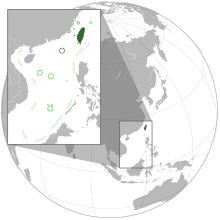LGBTQ rights in the Republic of China (Taiwan) | |
|---|---|
 | |
| Status | Legal |
| Gender identity | Sex reassignment surgery not required to change gender on official documents since 2021 |
| Military | All sexual orientations are allowed to serve openly. However, transgender people are prohibited. |
| Discrimination protections | Sexual orientation discrimination prohibited in education, employment, and all other areas; Gender identity discrimination prohibited in education |
| Family rights | |
| Recognition of relationships | Same-sex marriage since 2019 |
| Adoption | Full adoption rights since 2023[1] |
The rights of lesbian, gay, bisexual, transgender, and queer (LGBTQ) people in the Republic of China (Taiwan) are regarded as some of the most comprehensive of those in Asia.[2][3] Both male and female same-sex sexual activity are legal, and same-sex marriage was legalized on 24 May 2019, following a Constitutional Court ruling in May 2017. Same-sex couples are able to jointly adopt children since 2023. Discrimination on the basis of sexual orientation, gender identity and gender characteristics in education has been banned nationwide since 2004.[4] With regard to employment, discrimination on the basis of sexual orientation has also been prohibited by law since 2007.[5]
The Executive Yuan first proposed the legal recognition of same-sex marriage in 2003; however, the bill received strong opposition at that time and was not voted on in the Legislative Yuan. 14 years later on 24 May 2017, the Judicial Yuan ruled that the existing marriage law was unconstitutional, and that same-sex couples should gain the right to marry. The court gave the Legislative Yuan a maximum of two years to either amend existing laws or enact laws to provide legal recognition of same-sex marriage. According to the court ruling, if it failed to do so by 24 May 2019, same-sex marriage would automatically become legal for the first time in Asia.[6][7]
Although a 2018 Taiwanese referendum rejected same-sex marital rights 68% to 31%, it was ultimately vetoed by the government, affirming the court ruling.[8] On 17 May 2019, the Legislative Yuan approved a bill, submitted by the Executive Yuan, recognizing marriage for same-sex couples. The bill was signed into law by President Tsai Ing-wen on 22 May and went into effect on 24 May. Thus, Taiwan became the first country in Asia (and first non-UN recognized entity) to recognize same-sex marriage at the state level.[9]
The first Taiwan Pride was held in Taipei in 2003. By 2015, when the event was attended by 80,000 participants, it had become the second-largest LGBT pride in Asia, behind Tel Aviv Pride in Israel, which has led many to refer to Taiwan as one of the most liberal countries in Asia as well.[10] By 2019, attendance had grown to 170,000 participants.[11][12]
- ^ "Taiwan expands adoption rights for same-sex couples". 16 May 2023.
- ^ Steger, Isabella. "In a first for Asia, Taiwan legalized same-sex marriage—with caveats". Quartz. Archived from the original on 6 June 2019. Retrieved 20 May 2019.
Though Taiwan is widely regarded as the most progressive place in Asia for gay rights—the closest country in the region that has legalized gay marriage is Australia—conservative groups have long tried to pressure legislators to pass a law that does not grant same-sex unions equal rights to heterosexual ones.
- ^ Condon, Ali (29 October 2023). "Taiwan draws hundreds of thousands in East Asia's largest Pride march". PinkNews. Retrieved 9 February 2024.
- ^ Gender Equity Education Act (Act, 13–14). 23 June 2004. Archived from the original on 23 June 2021. Retrieved 9 April 2018. Archived 13 November 2021 at the Wayback Machine
- ^ Employment Service Act (Act, 5). 23 May 2007. Archived from the original on 23 June 2021. Retrieved 9 April 2018. Archived 23 June 2021 at the Wayback Machine
- ^ Judicial Yuan Interpretation No. 748 (Constitutional Interpretation). 24 May 2017. Archived from the original on 8 April 2018. Retrieved 8 April 2018. Archived 8 April 2018 at the Wayback Machine
- ^ Wu, J.R. (24 May 2017). "Taiwan court rules in favor of same-sex marriage, first in Asia". Reuters. Taipei. Archived from the original on 8 June 2019. Retrieved 8 April 2018.
- ^ France-Presse, Agence (26 October 2019). "Thousands attend Taiwan's first pride since legalisation of gay marriage". The Guardian. AFP. Retrieved 31 March 2023.
- ^ "Taiwan legalises same-sex marriage, a first in Asia". ABC News. Australian Broadcasting Corporation. 17 May 2019. Archived from the original on 28 May 2019. Retrieved 20 May 2019.
- ^ McCormick, Joseph Patrick (31 October 2015). "Asia's biggest Pride takes place as tens of thousands march in Taipei". Pink News. Archived from the original on 9 May 2019. Retrieved 24 May 2017.
- ^ 同婚元年!台灣同志遊行 17萬人上街挺多元創紀錄. Yahoo! (in Chinese). 26 October 2019. Archived from the original on 15 September 2020. Retrieved 23 June 2021.
- ^ Cite error: The named reference
nytwas invoked but never defined (see the help page).